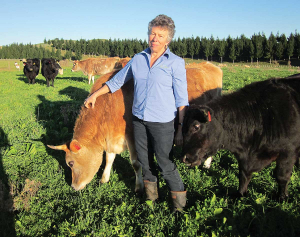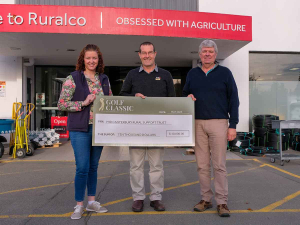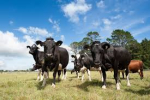Cows and pasture are not the villains in climate change, but could instead be our saviours, says Hawke’s Bay farmer, soil scientist and consultant Phyllis Tichinin.
An executive member of the Organic Dairy and Pastoral Group (ODPG) and on the organising committee of the group’s upcoming national conference, Tichinin says with regenerative farming methods, the grazing sector alone could make New Zealand carbon-negative.
“Cows are not bad. They’re actually a very important part of reversing global warming and CO2 levels quickly and productively.”
Tichinin said that over the last 30 years New Zealand farmers have assumed that what we see in terms of rooting depth and fibrousness is normal and assume that the soil is going to deteriorate as we till and graze.
“It doesn’t have to be that way. That’s not the way it would happen on a fully-functioning ecosystem.”
Tichinin says pasture can be restored to health by mimicking nature. Grasslands such as the Serengeti and North American Great Plains grew tall in between intensive but brief grazing by passing herds.
The ODPG is a mainly North Island-based group with around 120 members, mostly organic beef and dairy farmers. With a focus on farmer-to-farmer education and resource-sharing, it is about to hold its first South Island conference, at Lincoln University over the weekend of March 7 and 8. It is encouraging South Island farmers to attend.
The main speaker will be Dr Walter Jehne, former CSIRO climate scientist and microbiologist and founder of Healthy Soils Australia. Other speakers include Tichinin and freshwater ecologist Dr Mike Joy.
She said the focus of the conference will be soil carbon sequestration – grazing in a way that increases organic matter in the soil.
“We’re focussing not just on farming without the chemicals, but actually actively consciously farming to grow specifically the soil carbon sponge because that’s a primary indicator of soil health.”
Tichinin, a self-described “contrarian”, ran Jerseys because of their higher fat content, both in their milk and in their bodies.
She said that leaving Jersey bull calves with their mothers allowed them to lay down crucial early fat cells, then put down lots of fat to be harvested at slaughter at four to five years instead of the usual two.
Overseas there was “huge” awareness of the importance of fat soluble vitamins like A and D and K2 and conjugated linoleic acids, said Tichinin.


















